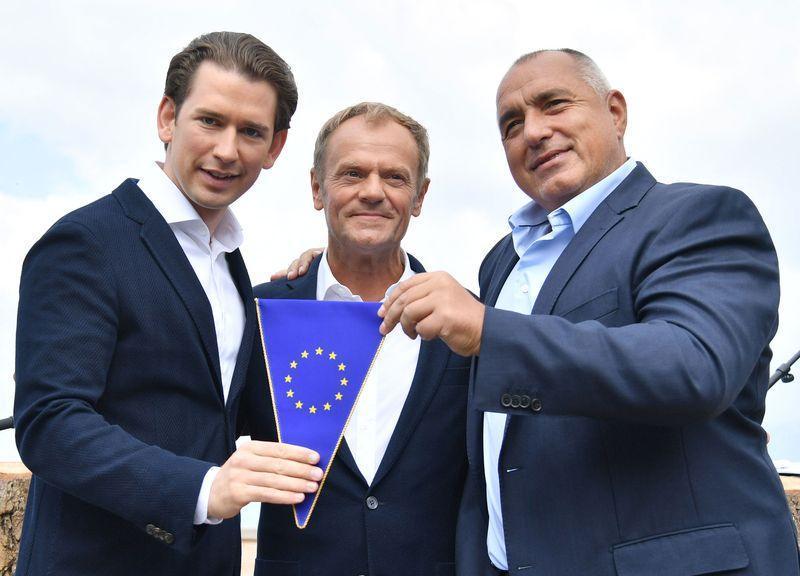
Austria has taken over the rotating presidency of the European Union with a pledge to better secure the 28-nation bloc’s external borders.
At a ceremony on June 30 outside the Alpine town of Schladming, Austrian Chancellor Sebastian Kurz said the six-month presidency is "an honor for us, but also a great responsibility."
"We know that the international environment is difficult right now," Kurz said.
Bulgarian Prime Minister Boyko Borissov, EU Council President Donald Tusk, and Austrian Prime Minister Sebastian Kurz attended the handover ceremony in Austria’s town of Schladming .
Kurz, who took the helm after winning elections last year and becoming the EU’s youngest head of government at just 31, said the motto got Austria presidency would be: “A Europe that protects”.
Vienna’s term officially starts July 1.
The presidency of the Council rotates among the EU member states every six months.
Turkey-Austria ties severely damaged after referendum
Ties between Ankara and a number of European countries were hit in 2017 ahead of the controversial April 2017 referendum on shifting to an executive presidential system, with many Turkish politicians not permitted to hold pre-scheduled meetings.
Ahead of that referendum, Turkish ministers sought to drum up support in countries with large Turkish communities, like the Netherlands and Germany. Those countries imposed bans on security grounds that angered Istanbul, and Erdoğan and some of his allies at the time compared the German government to “Nazis.”
“[Erdoğan’s] Turkish leadership has been trying to exploit Europe’s communities of Turkish origin for many years,” Kurz told ORF radio in a broadcast of remarks on April 20.
“Turkish election campaign appearances in Austria are unwanted and we will therefore no longer allow them,” he added.
For the parliamentary and presidential elections coming up on June 24, Sarajevo became the only campaign stop for the longtime ruling Justice and Development Party (AKP) and President Recep Tayyip Erdoğan as governments in Austria, Germany and the Netherlands said they would not allow rallies for the Turkish elections this time around as well.
Turkey strongly criticized the bans and said the moves were “racist” and “undemocratic.”
Several hundred thousand people in Austria are Turkish or of Turkish origin.
Kurz’s conservatives are in a coalition government with the anti-Islam Freedom Party, making Austria the only Western European country to have a far-right party in government.
Both parties believe the EU should break off Turkish accession talks.
Austria: Fast facts
Here are some facts about the landlocked and wealthy Alpine country of 8.75 million people, a member of the European Union since 1995 but outside the NATO military alliance.
Modern Austria was born in 1918 from the ruins of World War I and the Austro-Hungarian empire, reduced to a small rump of what was once a vast empire.
Violence between far-right and left-wing radicals marked the interwar period.
Adolf Hitler annexed his native country into the Third Reich in 1938.
A fifth of the population lives in the capital Vienna, a city that regularly scores highly in global surveys for quality of life with its rich culture and impressive architecture.
One in two Viennese was either born abroad or has a foreign-born parent and the population of the city -- home to myriad international organisations -- is growing fast.
Vienna is a byword for classical music, home at one time to Mozart, Beethoven and Schubert. It was a cultural and intellectual hub in the late 19th and early 20th century.